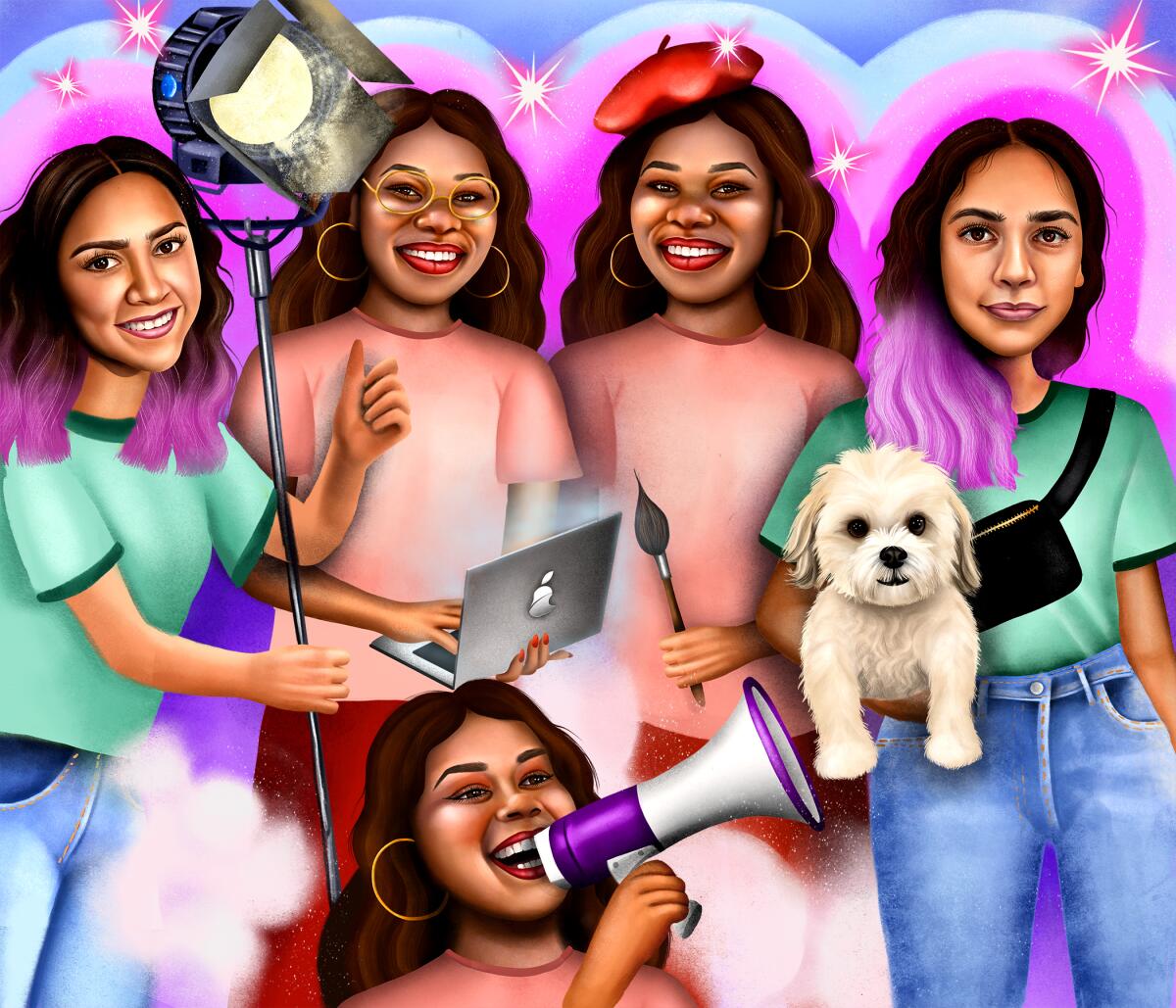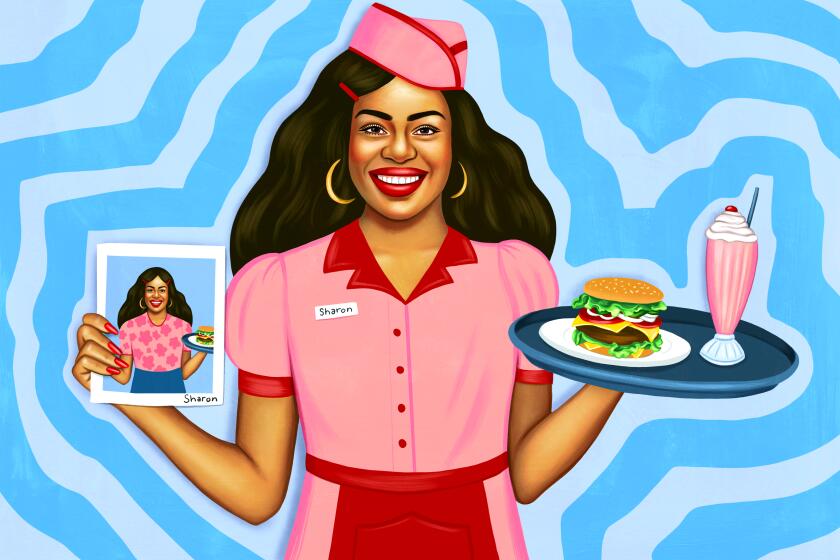The 5 best pieces of advice we heard this year about starting a career in Hollywood

- Share via
When you aspire to work in Hollywood, it’s hard not to be seduced by the promise of a highly Instagrammable lifestyle: the luxury of getting paid to be creative, the photogenic people on red carpets and the fans who adore your work.
But navigating a career in the entertainment industry can be confusing — especially if you don’t have connections — because there are countless pathways and no guarantees.
In June, The Times launched its guide to entertainment industry careers to help demystify one of the most popular industries in Los Angeles. In these articles, we ask people working in Hollywood what cold, hard truths newcomers need to know in order to make smart, practical decisions about their careers.
We also explain what a lot of the jobs are. Every film and television show displays a long list of them, a nod to every single person it took to bring that vision to the screen.
We hope you’ll continue telling us what you want to know about working in Hollywood so we can help you find answers. Here’s some of the best pieces of advice we’ve heard so far.
Finding a community is key to booking jobs (and also staying sane)
Hollywood is still all about whom you know, but arguably more important than meeting showrunners, casting directors and producers is building a solid network of friends.
You can find your community of creatives in many ways — such as through classes, events, small theaters, advocacy nonprofits, film festivals or social media — but ideally you make friends while you work on projects and you all move up together.
People like Gennifer Hutchison (who gave advice on how to become a TV writer) and Shaz Bennett (who shared how to get a job as a TV director) told us that the group of assistants they befriended as newcomers in the industry are still the people who support them (and sometimes give them jobs) today.
People you come to trust will also be the ones who can help you spot scams and manage your mental health. It’s a rough industry, full of extreme highs and lows. Rejection is the norm. You’ll need friends.
Rejection and uncertainty are part of working in Hollywood, but joy, creativity and fun can be too. Here’s how to manage your mental health.
Learn by doing (which sometimes requires volunteering your time or investing your own money)
The reality of the industry is that it’s so competitive that it’s often hard to make money until you have proven you have the skills to be hired for a paying gig. So if you’re an actor, you might have to start acting in student films for free to create a reel. If you want to be an animal trainer, you’ll need to volunteer cleaning kennels and rearing baby animals.
For some jobs, you’ll not only be working for free, but you’ll also need to invest your own money. If you want to be a director, you might need to fund — or crowd-fund — your own projects. If you want to be a gaffer, camera person or a voice actor, you’ll likely need to invest in equipment.
So how do you make a living in the meantime? It depends on your situation, but for a lot of people, pursuing an entertainment career requires balancing your dream with your side jobs and side hustles.
For many people who pursue entertainment as a career, it takes years to get yourself to where you are making money from your creative work. For making money in the meantime, there’s always waiting tables. But more and more people are turning to platforms like TikTok, Twitch and Patreon.
Save up before you move or quit your job
There are advantages to being in Los Angeles amid the hustle and bustle of the entertainment industry, but you can start your Hollywood career from anywhere.
If you’re a writer, you don’t need to be paying L.A. rent in order to churn out your portfolio of screenplays. If you — or your child — want to be an actor, there are advantages to developing your craft locally before uprooting your life.
Even after actor and social media personality Kendall Kyndall had attracted more than a million followers on Instagram, he stayed in Michigan working in human resources until he had saved enough money to last a year and a half.
“A lot of people back home were saying, ‘You need to go to L.A., you need to quit your job,’” he told The Times. “And yes, I did quit my job, but I made a plan.”
Zino Macaluso, a director at SAG-AFTRA, recommended having at minimum $5,000 in the bank, access to a car, a living arrangement and a part-time job before you move to L.A. This will protect you from being vulnerable to those who might try to take advantage of you and your wallet.
Voice actor Joe Zieja told The Times that another benefit to having a cushion is that you can be more selective about the jobs you take. “You can only be as picky as your bank account allows you to be,” he said.
Disembodied voices are ubiquitous in the media, reflecting the growing demand for voice actors. It’s a highly competitive industry that’s tough to break into; here are some tips.
Understand what the pathways to your dream job are
Hollywood is about storytelling, and there are a lot of different stories people tell about how they got started in the industry.
But it’s important to know which stories are helpful to you and which ones are not. Some tales that have built the myth of Hollywood — such as the actors who were discovered while walking their dog, then booked a role in their first audition and appeared on a surprise hit — rarely happen in real life.
There are stories that tell of more common paths to success but may still be irrelevant to you. Someone who grew up with parents in the industry knew how it worked since they were a kid. You may not have that head start.
And then there are stories that are less glamorous, but they show possible steps to get to a destination — even if the steps are all over the place.
In our “Explaining Hollywood” series, we offer specific advice for specific careers — including how to become an editor, a publicist, a foley artist and more.
Does it require going to a trade school? Are there fellowships to apply to? Do most people start as an assistant? What do you need to do first before you look for an agent? Are there a list of websites where you can apply for freelance gigs?
Ben Lopez, executive director of the National Assn. of Latino Independent Producers, told The Times that he tells up-and-comers to do their research.
“People apply everywhere hoping they’ll get in somewhere, but make it targeted so you’re not wasting years and years looking for that right job and opportunity,” he said.
Every year, thousands of kids decide they want to try to land jobs as professional actors. The learning curve for parents is steep, and the path can be costly.
Know that there’s more to life than Hollywood
Hollywood can be brutal, and even people who are successful can get caught up in — and beaten down from — chasing the next high.
Therapist Brian Torres, who works with many clients in the entertainment industry, said the most toxic part about Hollywood is the myth that if you aren’t devoting 110% of your energy to the industry 110% of the time, it’s all going to disappear.
He tries to get creatives to make room for other career possibilities so they don’t feel stuck (or dependent on other people’s validation) for happiness.
Often, the skills that make you want to pursue a job in Hollywood are transferable. Sound designers are in demand in the videogame and tech industries. Writers can write for any industry. Producers are great organizers and project managers. Practical special-effects artists would likely be great carpenters and welders.
Actor Randall Park told The Times that it’s important to remember that your career is not the most important aspect of living a happy and fulfilled life. But he also said: “It makes sense that the funnest job in the world is really hard to get. ... If you want to experience that much fun for a living, you gotta go through some hoops.”
Send the L.A. Times your questions about breaking into and working in the entertainment industry.
More to Read
Inside the business of entertainment
The Wide Shot brings you news, analysis and insights on everything from streaming wars to production — and what it all means for the future.
You may occasionally receive promotional content from the Los Angeles Times.
















